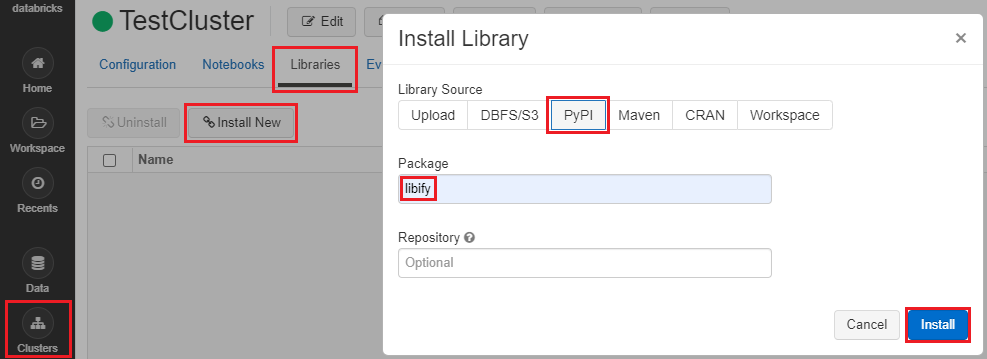Import Databricks notebooks as libraries/modules
Project description
Libify
Libify makes it easy to import notebooks in Databricks. Notebook imports can also be nested to create complex workflows easily. Supports Databricks Runtime Version 5.5 and above.
Installation
- Click the Clusters icon in the sidebar
- Click a cluster name (make sure the cluster is running)
- Click the Libraries tab
- Click Install New
- Under Library Source, choose PyPI
- Under Package, write libify
- Click Install
Typical Usage
After installing the package, add the following code snippets to the notebooks:
-
In the importee notebook (the notebook to be imported), add the following cell at the end of the notebook. Make sure that
dbutils.notebook.exitis not used anywhere in the notebook and that the last cell contains exactly the following snippet and nothing else:import libify libify.exporter(globals())
-
In the importer notebook (the notebook that imports other notebooks), first import
libify:import libify
and then use the following code to import the notebook(s) of your choice:
mod1 = libify.importer(globals(), '/path/to/importee1') mod2 = libify.importer(globals(), '/path/to/importee2')
Everything defined in
importee1andimportee2would now be contained in the namespacesmod1andmod2respectively, and can be accessed using the dot notation, e.g.x = mod1.function_defined_in_importee1()
Databricks Community Cloud Workaround
Databricks Community Cloud (https://community.cloud.databricks.com) does not allow calling one notebook from another notebook, but notebooks can still be imported using the following workaround. However, both of the following steps will have to be run each time a cluster is created/restarted.
-
Run step 1 from above (Typical Usage). Make a note of the output of the last cell (only the part marked below):
-
In the importer notebook, call
libify.importerwith theconfigparameter as the dictionary obtained from the previous step:import libify mod1 = libify.importer(globals(), config={"key": "T5gRAUduh9uSbhHIrj2c9R4UbrXUt2WiA4aYIpl3gGo=", "file": "/tmp/tmpmcoypj24"})







Project details
Release history Release notifications | RSS feed
Download files
Download the file for your platform. If you're not sure which to choose, learn more about installing packages.
Source Distribution
Built Distribution
Filter files by name, interpreter, ABI, and platform.
If you're not sure about the file name format, learn more about wheel file names.
Copy a direct link to the current filters
File details
Details for the file libify-0.78.tar.gz.
File metadata
- Download URL: libify-0.78.tar.gz
- Upload date:
- Size: 3.4 kB
- Tags: Source
- Uploaded using Trusted Publishing? No
- Uploaded via: twine/3.2.0 pkginfo/1.5.0.1 requests/2.24.0 setuptools/50.3.0 requests-toolbelt/0.9.1 tqdm/4.49.0 CPython/3.8.5
File hashes
| Algorithm | Hash digest | |
|---|---|---|
| SHA256 |
9d6c0ad806f4c86f152611c5ade3d1d735ef8270af0ea957f5abc27d293dda8a
|
|
| MD5 |
ac2f49b91e95eb28a595a5f806f9fd7b
|
|
| BLAKE2b-256 |
a71b25fad1a1baec0b5f0db6083e9488c43a4662641ad56057e652c0a013c8e8
|
File details
Details for the file libify-0.78-py3-none-any.whl.
File metadata
- Download URL: libify-0.78-py3-none-any.whl
- Upload date:
- Size: 4.3 kB
- Tags: Python 3
- Uploaded using Trusted Publishing? No
- Uploaded via: twine/3.2.0 pkginfo/1.5.0.1 requests/2.24.0 setuptools/50.3.0 requests-toolbelt/0.9.1 tqdm/4.49.0 CPython/3.8.5
File hashes
| Algorithm | Hash digest | |
|---|---|---|
| SHA256 |
a17fd93ef2237a204c9192c3373c2ba94680438f1356099aa095697e970493e8
|
|
| MD5 |
a4febf06a13960aac459287a1e6a066c
|
|
| BLAKE2b-256 |
6e7de15969adc09753ecd51de784763b5c6892cbb7bf238f294fc22efb1406f8
|














